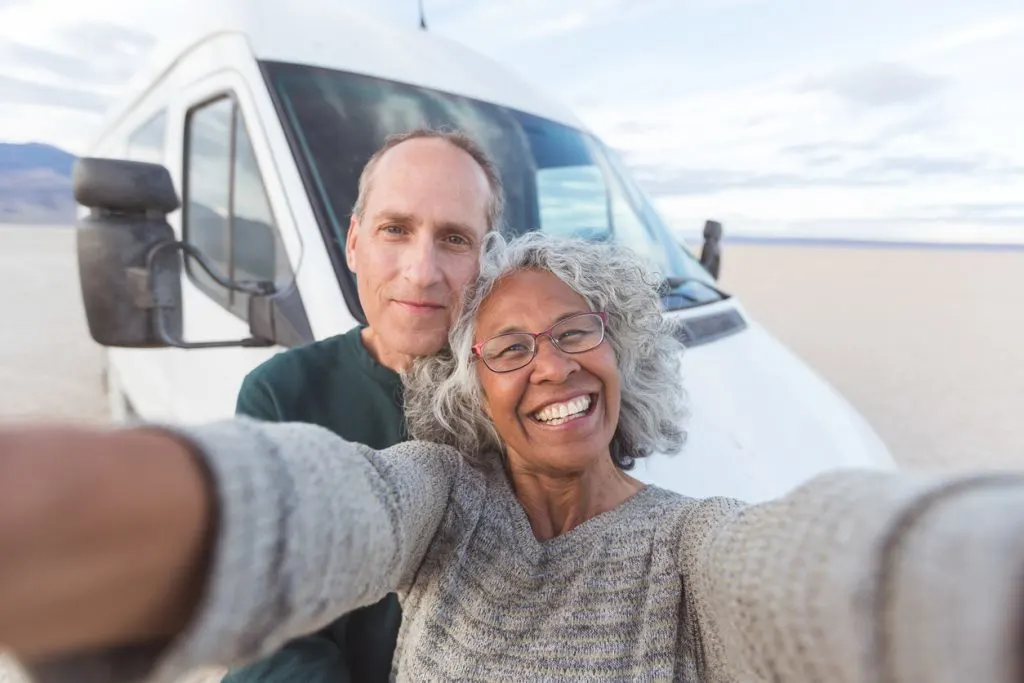Many nomadic campers relied on Amazon for more than two-day shipping for several years. Some RVers used Amazon’s Campforce program to fund their travel adventures.
Unfortunately, all good things must end, and this work program is no exception. While it was good while it lasted, campers now have to find alternative employment opportunities to continue living their lives on the road.
Today, we’re diving into the ending of this popular program and sharing a few alternative employment options worth considering to fund your nomadic life.
Let’s get started!
Amazon Silently Ends Its Camperforce Program
With no major announcement, Amazon quietly ended its popular seasonal employment program, Camperforce. They’ve scrubbed their website of any mention of the program and have deactivated links for the site. Some are experiencing shock that Amazon gave the program the ax. However, not everyone was caught off guard by the news.
One industry expert said, “the writing was on the wall.” Many felt it wasn’t a good sign when the company switched to the system. The program included Amazon providing additional money to employees for campsites. In exchange, the company no longer offered assistance securing spots or dealing with the logistics.
What Was Amazon’s Camperforce Program?
Amazon Camperforce was a seasonal employment program offered during the busiest times of year for the retail giant. Workers would help with picking, packing, and shipping packages at fulfillment centers all over the country.
It was a fantastic opportunity for RV and van campers to enjoy their nomadic lifestyle and get paid by Amazon simultaneously. Some workers would move from one location to the next throughout the year.
The program launched in 2008 when Amazon hired several hundred RVers to work at the Coffeyville, Kansas, fulfillment center. However, more than a decade later, the number of worksites had increased to 13. The program peaked in 2021 at 26 Camperforce sites before getting shut down at the close of 2022.
The starting pay for these positions was around $18 per hour, and at one point, employees were eligible for a $3,000 sign-on bonus. Assignments typically lasted anywhere from six to 14 weeks and provided employees with fantastic benefits.
What Made The Camperforce Program Famous?

Nomadic life has become popular over the last half a century. It was even featured in the 2021 Golden Globe-nominated film Nomadland. Because the lifestyle was gaining popularity, the film was a huge success.
Nomadland gave an authentic glimpse at the life of nomads and put the Amazon program popular with RV and van campers in the spotlight. It shows how one employee picks and packs orders shipped to Prime customers. After a long shift, the employee heads back to their van to grab a bite to eat and take care of daily chores.
The Camperforce Program experienced tremendous success, largely due to the boom in RVing. Being able to find work all across the country made it easy for nomads to travel and make a living. It was the perfect combination for many travelers.
What is Workamping?
Workamping is a lifestyle where nomads combine work and camping. It typically involves taking on short-term or seasonal jobs in exchange for a place to park an RV or other recreational vehicle. It can be a work arrangement that’s mutually beneficial for the employee and employer.
These jobs can range from working in a campground or RV park to employment in the tourism or hospitality industries, such as at a gift shop, restaurant, or theme park. Workampers often get discounts or other perks, like free camping, in exchange for their labor.
Workamping allows individuals, couples, or families to travel and see new places while earning money and experiencing new cultures and communities. If you want to travel with the seasons, this is a great way to do it.
Pro Tip: Don’t know where to start when finding a Workamping gig? Check out How Four Couples Get Paid To Travel in Their RV Camper.
What Do Full-Time RVers Do for Work?
While workamping can be a great way to make a living, it’s not the only option. Numerous possibilities exist for RVers to make money while enjoying RV life. The recent increase in employers being more open to remote work has made RVing possible for more people.
RVers work in various freelance positions, online consulting, sales, customer service, virtual teaching, and tutoring. Many who dream of living this lifestyle will talk with their employers about the possibilities of working remotely. As long as their employer is on board with the idea, they can work from almost anywhere in the country.
Some full-time RVers choose to start their own businesses, such as offering pet- and house-sitting services or mobile repair services. The key to earning a living as a full-time RVer is finding a job or creating a business that can be done remotely and is easily portable.

3 Alternative Workamping Jobs
Unfortunately, now that Amazon has canceled CamperForce, campers must consider alternative options. Luckily, plenty of other workamping jobs are available and can be great opportunities. Let’s look at a few of them.
Camp Host Jobs
Camp host jobs are seasonal positions available in campgrounds and RV parks. The primary role of a camp host is to provide customer service to guests and help maintain the facilities. Campgrounds typically need camp hosts during the busiest times of the camping season. Since this can occur at different times throughout the country, it can be easy to travel with the seasons.
Pay and duties vary dramatically by location. While some provide a weekly stipend or paycheck, most offer little more than a free place to camp. Responsibilities include providing customer service to guests, selling firewood, and enforcing the campground rules. Landscaping and cleaning bathrooms and showers are also fairly common tasks.
If you want to become a camp host, the best way is to contact any campgrounds that interest you. Each location will have a process they use to select camp hosts. However, you may need to apply six months or more ahead of time for certain assignments.
Pro Tip: Whether or not you work as a campground host, you’ll want to know Should You Tip the Campground Host at an RV Park?
The Sugar Beet Harvest
The sugar beet harvest occurs every year in the late fall and early winter. This requires a large number of workers to do an incredible amount of work quickly. Employees typically work ten to 15 days, making upwards of $3,700. In addition to premium pay on the weekends and completion bonuses, the company pays all camping fees.
Workers typically spend 12-hour shifts in cooler temperatures while using heavy machinery. The job isn’t easy and can be long and tiring. Employees must be on their feet for almost the entirety of their shift. They also need to bring enough food, water, and clothing for their work hours.
The most popular locations for sugar beet harvesting are Montana, North Dakota, Minnesota, and Michigan. If you want to visit any of these states, working the sugar beet harvest can be a great way to fund your adventures.
Gate Attending
Another fantastic workamping option is to be a gate attendant. These positions are perfect for traveling couples as you can make approximately $200 per day ($6,000 per month). These are security positions where you track who comes and goes for oil and gas companies.
While the pay can be great, the shifts tend to be long and demanding for couples. The pair usually has to maintain 24-hour coverage of the gate. As a result, couples often split the 24 hours into two 12-hour shifts. This can make spending quality time with one another tough outside working hours.
These jobs are found mostly in Texas, Oklahoma, Colorado, New Mexico, and Louisiana. In addition to oil and gas fields, plenty of wind and solar farms and construction sites hire gate attendants.
Campers Look Beyond Amazon
Amazon quietly left campers out to dry when they shut down CamperForce. However, as you can see, a few great alternatives are worth considering. These opportunities allow you to see the country and experience new cultures while still paying your bills. If you want to enjoy the freedom of life on the road, these jobs can help make that possible.
We’ll Help You Find the Best Free Camping in the USA
You should give it a try!
As a matter of fact, these free campsites are yours to enjoy. Every time you pay federal taxes, you’re contributing to these lands.
Become a FREE CAMPING INSIDER and join the 100,000 campers who love to score the best site!
We’ll send you the 50 Best Free Campsites in the USA (one per state). Access the list by submitting your email below: